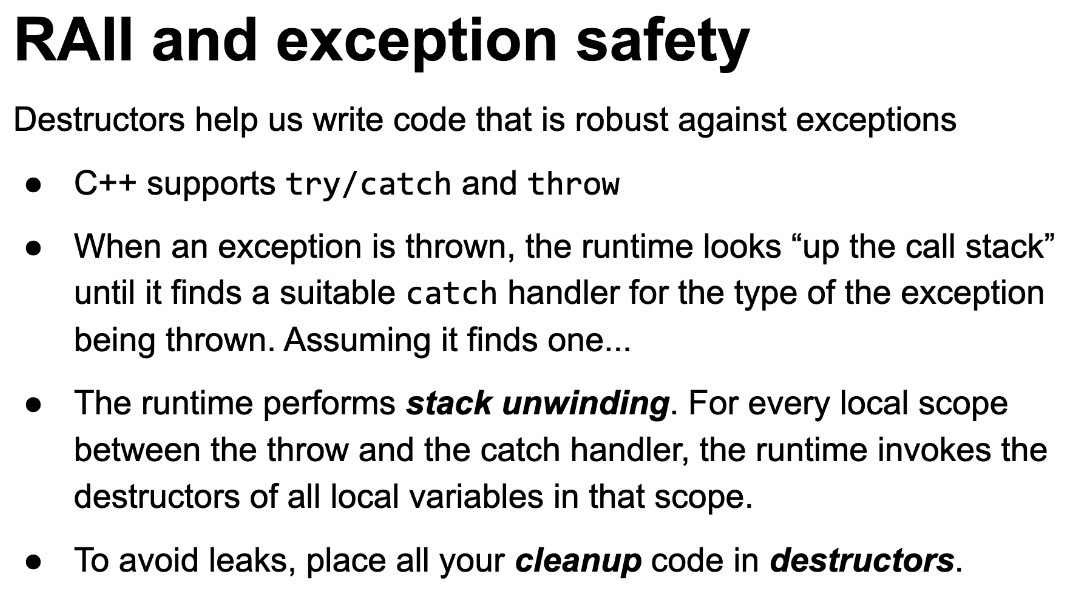- static storage
- thread-local storage
- automatic storage
- dynamic storage
Memory and pointers
APM 50179 EP
Storage types
Static storage
- fixed address determined at compile time
-
global static variables are
- constructed before execution enters main
- deleted after execution leaves main
- static variables in a scope are constructed before the execution of this scope.
- the order of construction is complex
- no runtime cost to create the storage
appropriate for data that will be used for the whole life of the program
Automatic storage
- memory reserved by the compiler (stack)
- exists into their scope
- deleted when they leave the scope
- limit to the total amount of memory in the stack
Dynamic storage
- memory requested at runtime (heap)
- must be explicitly requested (new)
- must be explicitly destroyed (delete)
- the address is determined at runtime
- no limit to the total amount of memory
static pitfalls
static pitfalls: step 0
Open the static directory.
What kind of variable is r ?
static pitfalls: step 1
Make r static.
What do you observe ?
static pitfalls: step 2
Initialize m_count to 10 in the resource class.
Make m static and r a static member of manager class.
Create a print() function in manager class which prints Hello manager and acquire the resource.
What do you observe ?
static pitfalls: step 3
Remove the static member to the resource.
Create a function class which returns a reference to a static resource created in this function.
Use this function when you want to acquire the resource.
Pointer
A pointer variable is a variable which stores a memory address.
A pointer variable must be assigned to be used.
Pointer: example
double d = 0.5;
double* p = &d;
float* p_f = nullptr;
std::cout << d << std::endl;
std::cout << *p << std::endl;
std::cout << p << std::endl;
std::cout << p_f << std::endl;
std::cout << *p_f << std::endl; // Error: segfault
int i = 4;
double* p2 = &i; // Error: cannot convert from int* to double*
Pointer: cast
int i = 4;
int* pi = &i;
// double* d = (double*)pi;
double* d = reinterpret_cast<double*>(pi);
std::cout << i << std::endl;
std::cout << pi << std::endl;
std::cout << d << std::endl;
std::cout << *pi << std::endl;
std::cout << *d << std::endl;
Pointer: new and delete
int* i = new int; // allocates an uninitialized integer
int* i2 = new int(5); // allocates an integer initialized to 5
int* i3 = new int[5]; // allocates an array of 5 integers
delete[] i3; // free the memory used by the array i3
delete i2; // free the memory used by i2
delete i; // free the memory used by i
How to allocate and deallocate properly a double**
with nx rows and ny columns.
Pointer: struct or class
struct A
{
double x;
double y;
};
A* a = new A;
std::cout << (*a).x << std::endl;
// or
std::cout << a->x << std::endl;
delete a;
Pointer: arithmetic
int* ar = new int[10];
// Or
std::vector<int> v(10);
int* ar = v.data();
int* ar2 = ar + 2;
std::cout << *ar2 << std::endl;
std::cout << ar[2] << std::endl;
std::cout << (ar2 - ar) << std::endl;
int* ar3 = ar2 - 1;
std::cout << *ar3 << std::endl;
std::cout << ar[1] << std::endl;
Implement the palindrome algortihm using two pointers.
The string will be stored in an std::string.
Exceptions
void mean(const std::vector<double>& param)
{
if(param.size() == 0)
{
throw std::runtime_error("param size is 0")
}
else
{
// ...
}
}
Exceptions
try
{
std::vector<double> v(0);
mean(v);
}
catch(std::exception& e)
{
std::cout << "caught exception - " << e.what() << std::endl;
}
Try to compile the example found in the exception directory
and fix it.
Exceptions
void test_resource()
{
resource r;
try
{
r.acquire();
if (...)
{
r.release();
return;
}
r.print_message();
r.release();
}
catch(std::exception& e)
{
std::cout << "exception caught: " << e.what() << std::endl;
r.release();
}
}
What do you think about this code ?

Extract from the talk of Arthur O'Dwyer at CppCon 2019

Extract from the talk of Arthur O'Dwyer at CppCon 2019
Exceptions - RAII
void test_resource()
{
resource r;
resource_guard g(r);
r.print_message();
}
Write what resource_guard should do.
Exceptions - RAII
class resource_guard
{
public:
resource_guard(resource& r);
~resource_guard();
private:
resource& m_r;
};
Exceptions - RAII
resource_guard::resource_guard(resource& r)
: m_r(r)
{
m_r.acquire();
}
resource::~resource_guard()
{
m_r.release();
}
Exceptions - noexcept
void function() noexcept;
The noexcept keyword
- is part of the signature
- tells the compiler that the function does not raise
- the compiler does not check the validity of noexcept
- is mainly used for performance purpose
Memory Management
Result* make_computation(class_A& a, class_B& b);
Memory Management
Result* make_computation(class_A& a, class_B& b)
{
Result* r = new Result();
...
return r;
}
or
Result* make_computation(class_A& a, class_B& b)
{
...
return a.get_result(b);
}
Memory Management
The owner of a resource should be readable and obvious when you read the source code.
This makes it clear who is reponsible for the destruction of the data and to avoid potential memory leakage.
Memory Management
Smart pointers help to specify the ownership.
There are two versions:
std::unique_ptr: unique ownershipstd::shared_ptr: shared ownership
std::unique_ptr
class coord
{
public:
coord(double x, double y)
: m_x(x), m_y(y)
{}
void print() const
{
std::cout << "coords(" << m_x << ", " << m_y << ")" << std::endl;
}
private:
double m_x, m_y;
};
std::unique_ptr
int main()
{
auto p_1 = std::unique_ptr<double>(new double(4.));
auto p_c = std::make_unique<coord>(4., 3.);
auto p_a = std::unique_ptr<double[]>(new double[1000]);
p_c->print();
// auto p_2 = p_1; // Error: unique_ptr is not copyable
auto p_2 = std::move(p_1);
std::cout << *p_2 << std::endl;
std::cout << p_1 << std::endl;
}
std::shared_ptr
std::shared_ptr<int> p = new int;
std::shared_ptr<int> p2(new int);
auto p3 = std::make_shared<int>();
void function()
{
auto p = std::make_shared<int>(); // ref_count = 1;
{
std::shared_ptr<int> p2 = p; // ref_count = 2;
// ...
} // p2 destructor is called, ref_count = 1
} // p destructor is called, ref_count = 0, deletes the internal pointer
to be used with caution because it is expensive !
References
- Les données et fonctions membres statiques
- Optimized C++ chapter 6
- Back to Basics: RAII and the Rule of Zero at CppCon 2019
- Back to Basics: Smart Pointers at CppCon 2019